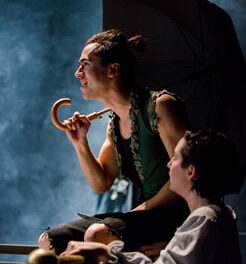British tenor Ian Bostridge (b.1964) has accumulated quite a collection of accolades including several Gramophone Awards and 15 Grammy nominations (including three awards). He has worked with numerous conductors and orchestras and has appeared in opera and on concert stages throughout the world. A large audience attended Thursday night’s performance to hear Bostridge sing Schubert’s Die Winterreise (Winter Journey).
Franz Schubert (1797-1828) wrote Die Winterreise the year before his death, setting the poetry of Wilhelm Müller (1794-1827), a high-school teacher and the Imperial Librarian at Dessau. The 24 compositions that make up the song cycle (a collection of poems set to music that connect together to relate a story) “illustrate a single mood, that of despair.” (Karl Schumann) Indeed, the poems describe a lovesick man’s attempt to come to terms with his lover’s rejection as he meanders through a wintry night. The quintessential Romantic – a man rejected by love, aimlessly wandering with no human contact in a cold, unhospitable world.
Schubert had previously set some of Müller’s poetry in the composer’s other magnificent song cycle, Die schöne Müllerin (1823). Schubert probably found a comrade spirit in the wanderer in Die Winterreise, as the composer himself felt excluded from the Viennese culture and perhaps saw his own death on the horizon. Incidentally, this is yet another case of music immortalizing a person (in this case, Müller) who probably would not have been remembered by future generations – like Beethoven’s friend and patron Count Waldstein.
Bostridge’s recital was presented by the Wake Forest University Secrest Series. The 80-minute cycle was sung without intermission in the Brendle Recital Hall. Schubert’s setting of this dark poetry is stunningly vivid. The opening “Good Night,” which begins “A stranger I came, a stranger I depart,” is set in a minor mode dipping into major for a moment as the wanderer proclaims he will not disturb his ex-lover’s rest, the only positive moment in the poem.
“The Weather Vane,” with its constant spinning, features twists and turns in the piano depicting the unpredictable wind. The image of the crow appears in several songs, flying over the barren earth in search of carrion. The river is frozen, the landscape barren. The only place of rest is the graveyard, called “The Inn.” The final song, “The organ grinder,” is found on the outskirts of town, droning away on his instrument (mirrored by open fifths in the accompaniment, with no harmonic motion throughout the song) – undeniably desolate.
From beginning to end, Bostridge’s personal identification with the music was striking. The tenor was certainly theatrical, in the sense that he communicated the despair and pain of the poetry, brought into sharp relief by the music. However, the poems were not “staged,” other than that the singer freely moved in front of the piano, sometimes staring directly at the audience, sometimes with head forward, singing down, and occasionally leaning over the piano, his back to the audience.
Bostridge’s delivery was direct, yet nuanced. The range of vocal timbres at his disposal was impressive. From barely audible quasi-whispering, to painful straight tones, to hearty outburst of heated emotion. Indeed, the precious (affected?) singing made the robust all the more striking.
The pianist, Julius Drake (b. 1959), was amazing. He was with Bostridge every step of the journey, supporting one moment, edging him forward in another. His playing was as solid, shaded, imaginative, and supportive as I have ever heard. His soft playing perfectly matched the singer’s intonation. His vigorous keyboard work was note-perfect. But the colors that he coaxed from the piano really were beyond belief. His playing painted every scene with absolute perfection.
The engaged audience rewarded the dedicated performance with a well-deserved standing ovation, bringing the seemingly emotionally exhausted artists to the stage several times.











